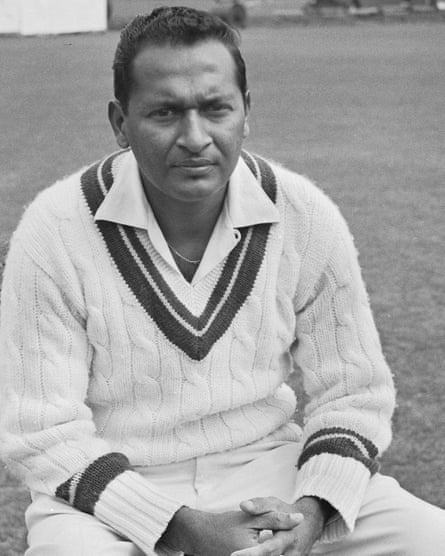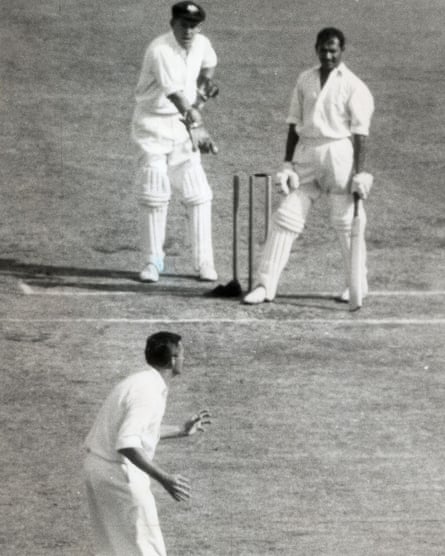Joe Solomon, a cricketer from the West Indies who passed away at the age of 93, was responsible for the run-out of Australia’s Ian Meckiff, resulting in the first-ever tied Test match in Brisbane in 1960.
Solomon’s role in a famous cricket match was remarkable due to the high-pressure situation of the final moments. With the scores tied and only one wicket left, Australia needed a single run from the last two balls to win. Kline appeared to have secured the victory with a hit towards the field, but Solomon quickly retrieved the ball and threw it directly at the stumps, taking down the wicket before Meckiff could reach the crease.
There were lively celebrations afterwards, even from some Australian supporters who, despite being disappointed by the outcome, enjoyed the excitement of experiencing such a unique event. This was the first tied match in the 84-year history of Test matches, with only one more occurring since then – India vs. Australia in 1986 in Madras (now Chennai).

Garfield Sobers, a teammate of Solomon, once stated that Australia could have potentially scored the final run if it weren’t for the exceptional fielding of Solomon. Sobers believed that Joe was the best choice for fielding, and his direct hit to take out Alan Davidson in the second innings was described as “a brilliant play that saved the match.”
Solomon’s batting skills, which led to his inclusion in 27 Tests for the West Indies from 1958 to 1965, were not as impressive as his exceptional fielding abilities. However, he proved to be a valuable asset in the middle order for his team. While he was known for his fluid playing style in regional cricket, he adapted a more reliable and determined approach at the Test level, serving as a contrast to the aggressive styles of players like Sobers and Rohan Kanhai. He displayed patience at the crease and provided stability during difficult situations, as seen in the tied Test where he scored 65 and 47 in the two innings to hold the team together.
Solomon was born in Port Mourant, a town in the Berbice region of British Guiana (currently known as Guyana). He was the third child out of five, with his father, John, working as a butler for the general manager of a nearby sugar estate. His parents, Marian and John, were both Catholics of Tamil descent. Their ancestors had migrated to Guyana as indentured laborers to toil on the sugar plantations.
Solomon, along with Kanhai and Basil Butcher, was among the many Guyanese cricket players who benefited from the progressive decision of the Sugar Producers Association (SPA) to appoint Clyde Walcott, a West Indies Test player, as a cricket organizer for the sugar estates in the country. While attending Corentyne High School, Solomon improved his accuracy in throwing by practicing knocking down mangoes from trees and using flat stones to aim at the stalks of the fruit without causing damage. Under Walcott’s guidance, he further developed his skills and played for Port Mourant and later for the East Indian cricket club (later renamed Everest) in the capital city of Georgetown.
Berbice continued to play representative matches and eventually made his first-class debut for British Guiana against Jamaica in 1956. In this match, he scored an impressive 114 not out. He followed this up with another strong performance of 108 against Barbados in the same season and then 121 in his next match against the touring team from Pakistan in 1958. These outstanding performances earned him the rare achievement of scoring a century in each of his first three first-class innings. He was then selected to join the West Indies tour to India and Pakistan in 1958-59, where he proved his value with several crucial innings in the middle order. Notably, he scored 45 and 86 in his debut match against India in Kanpur and a flawless 100 not out in the fifth match in Delhi.

He performed well in Pakistan and was the top scorer on that leg of the tour. However, the next year when he played two Tests at home against England, he did not have as much success. In one of the tests, he was even asked to open the batting. When he returned to the middle order for the 1960-61 series in Australia, he became a beloved player among the fans. In fact, during a match in Melbourne, the Australian captain Richie Benaud was booed by his own fans when Solomon’s cap fell on his stumps, resulting in a successful appeal for hit wicket.
Solomon was a highly skilled team member and was greatly appreciated as a companion and trusted advisor by his captain, Frank Worrell. Worrell’s enthusiastic leadership played a crucial role in creating an unforgettable experience during the Australia series, resulting in the West Indies players being celebrated with a ticker-tape parade through the streets of Melbourne to commemorate its end.
In 1961-62, Solomon played in four out of five Tests against India at home and participated in all five during the tour to England in 1963. He then played his final series at the age of 34 against Australia at home in 1965. Despite being a consistent player since his debut, he retired but continued to play for Guyana until 1969. Throughout his Test career, he accumulated 1,326 runs with an average of 34, and in first-class cricket, he maintained an average of 41.54. As an occasional leg spinner, he also took 51 wickets, four of which were in Tests.
Alongside his time as a cricketer, Solomon also held a job in the accounts department at a sugar plantation for several years. He would often take unpaid leave when he had to go on tour. In 1961, the SPA hired him as a cricket consultant to assist Walcott in training and organizing young players on the sugar plantations in Guyana.
After his retirement from playing, he remained involved in the field by taking on multiple roles within the Guyana Cricket Board such as president, honorary secretary, and selection chair. He also served as Guyana’s representative on the West Indies Cricket Board of Control and was responsible for selecting players.
In 1978, he assumed the role of manager for the West Indies tour to India. This was a challenging time for the team as many of their top players had left to join Kerry Packer’s rival tournament. However, with Solomon’s effective management abilities, honed under the guidance of Worrell and Walcott, a relatively inexperienced team was able to achieve a respectable 1-0 series loss.
During the mid-1980s, Solomon relocated to New York but still made frequent visits to his home country. His wife, Betty (formerly Dharry), whom he wed in 1959, passed away before him.
Source: theguardian.com

